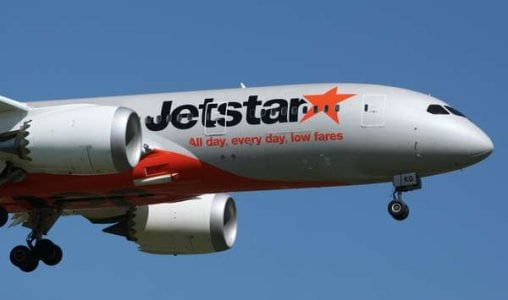Jetstar CEO issues public apology for past mishaps, encourages Aussies to give the airline another chance
- Replies 18
After serving the Australian aviation industry for twenty years, Jetstar has taken a significant step by issuing a formal apology to any customers they may have disappointed in the past.
The low-cost airline is now inviting people to try their services again and witness the positive changes they have made.
Jetstar's CEO, Stephanie Tully, made a special appearance on Melbourne's 3AW radio to personally extend this apology.
She expressed regret for any previous shortcomings of the airline and urged customers to give Jetstar another chance—and even encouraged everyone to experience the transformation the airline has undergone firsthand.

'It's time to give Jetstar a go,' said Ms Tully. 'For July, it looks like we have the best cancellations of any airline in Australia, so we have really been working hard to make sure Jetstar is at its best.'
In addition to improved performance, Ms Tully let participating customers know they could expect better on-time performance and fewer cancellations.
She also noted that Jetstar was returning to pre-pandemic levels of low cancellation rates and on-time performance.
In June, the Bureau of Infrastructure and Transport Research Economics (BITRE) reported that Jetstar had achieved the highest on-time arrival rate among major domestic carriers.
The airline's domestic cancellation rate also dropped significantly to 3.7 per cent. Jetstar's on-time performance improved to 66.2 per cent, just one per cent below the leading carrier, Virgin Australia, which had a rate of 67.9 per cent.
These indicators seem to suggest that Jetstar is providing a great customer experience. Additionally, the airline's staff is back to work, and most of the supply chain issues have been resolved.
Jetstar is also upgrading its fleet with new and advanced aircraft. By 2024, they plan to have all 18 Tesla Neo units, and by 2029, they will add five more units and 15 extra-long-range aircraft to their fleet.
With the increased aircraft supply, Jetstar plans to adjust its network to offer more flights. Moreover, the airline has announced seven new international routes in the past twelve months, including Sydney to Seoul, Brisbane to Auckland, and Melbourne to Fiji.
These additions provide customers with more diverse and affordable travel options.
Ms Tully further enticed customers by noting that Jetstar would always be the price leader and that cheaper seats wouldn't equate to lower quality.
'We democratised travel. We make travel possible for everybody, and we love that emotional connection to people that perhaps wouldn't otherwise travel, so it's time to give Jetstar a go,' she reiterated.
Jetstar's Chief Operations Officer, Matthew Franzi, further promised customers that significant improvements had been made in the airline's punctuality and reliability—though he acknowledged there was still more work to do, considering the airline was investing in new aircraft and staff.
When discussing the challenges faced by the airline, Ms Tully highlighted the impact of the pandemic.
The airline industry experienced a period of dormancy for a few years, which posed difficulties in restarting operations and reassembling the workforce. The airline also faced problems with its supply chain, particularly with obtaining necessary parts.
'So we have had to work extra hard and do extra things to ensure Jetstar is performing the way people expect,' she explained.
Before the pandemic, the airline faced challenges due to unprecedented demand for holiday travel, supply chain issues, and occasional technical problems, leading to customer dissatisfaction.

In 2020, airlines, including Jetstar, faced significant challenges that affected their reputation. Despite their best efforts, Jetstar experienced some damage to their track record.
However, the company remains determined to rebuild and regain customers' trust. They have ambitious plans and promises for the future, aiming to win back those who may have chosen other carriers as long as their services align with customer needs.
We would love to hear your thoughts on this matter, members. Are you open to giving Jetstar another chance? What improvements do you think the company should prioritise to win you over? Feel free to share your opinions in the comments section below!
The low-cost airline is now inviting people to try their services again and witness the positive changes they have made.
Jetstar's CEO, Stephanie Tully, made a special appearance on Melbourne's 3AW radio to personally extend this apology.
She expressed regret for any previous shortcomings of the airline and urged customers to give Jetstar another chance—and even encouraged everyone to experience the transformation the airline has undergone firsthand.

The CEO of Jetstar has issued an apology to 'everyone it has let down', pleading with Aussies to give the budget airline 'a go'. Credit: Pexels/Pascal Borener.
'It's time to give Jetstar a go,' said Ms Tully. 'For July, it looks like we have the best cancellations of any airline in Australia, so we have really been working hard to make sure Jetstar is at its best.'
In addition to improved performance, Ms Tully let participating customers know they could expect better on-time performance and fewer cancellations.
She also noted that Jetstar was returning to pre-pandemic levels of low cancellation rates and on-time performance.
In June, the Bureau of Infrastructure and Transport Research Economics (BITRE) reported that Jetstar had achieved the highest on-time arrival rate among major domestic carriers.
The airline's domestic cancellation rate also dropped significantly to 3.7 per cent. Jetstar's on-time performance improved to 66.2 per cent, just one per cent below the leading carrier, Virgin Australia, which had a rate of 67.9 per cent.
These indicators seem to suggest that Jetstar is providing a great customer experience. Additionally, the airline's staff is back to work, and most of the supply chain issues have been resolved.
Jetstar is also upgrading its fleet with new and advanced aircraft. By 2024, they plan to have all 18 Tesla Neo units, and by 2029, they will add five more units and 15 extra-long-range aircraft to their fleet.
With the increased aircraft supply, Jetstar plans to adjust its network to offer more flights. Moreover, the airline has announced seven new international routes in the past twelve months, including Sydney to Seoul, Brisbane to Auckland, and Melbourne to Fiji.
These additions provide customers with more diverse and affordable travel options.
Ms Tully further enticed customers by noting that Jetstar would always be the price leader and that cheaper seats wouldn't equate to lower quality.
'We democratised travel. We make travel possible for everybody, and we love that emotional connection to people that perhaps wouldn't otherwise travel, so it's time to give Jetstar a go,' she reiterated.
Jetstar's Chief Operations Officer, Matthew Franzi, further promised customers that significant improvements had been made in the airline's punctuality and reliability—though he acknowledged there was still more work to do, considering the airline was investing in new aircraft and staff.
When discussing the challenges faced by the airline, Ms Tully highlighted the impact of the pandemic.
The airline industry experienced a period of dormancy for a few years, which posed difficulties in restarting operations and reassembling the workforce. The airline also faced problems with its supply chain, particularly with obtaining necessary parts.
'So we have had to work extra hard and do extra things to ensure Jetstar is performing the way people expect,' she explained.
Before the pandemic, the airline faced challenges due to unprecedented demand for holiday travel, supply chain issues, and occasional technical problems, leading to customer dissatisfaction.
Key Takeaways
- Jetstar CEO, Stephanie Tully, has apologised to those let down by the airline and is urging Australians to give the budget airline another chance.
- Performance metrics and on-time-flight records have improved and returned to pre-pandemic levels, with reduced cancellation rates providing a more reliable service for travellers.
- Industry challenges such as supply chain issues due to the pandemic and increasing demand for flights following COVID lockdowns have been identified as contributing factors to the airline's previous performance.
- Jetstar plans to continue improving punctuality and reliability with further investment in new aircraft, increased staffing, and expansion of international routes.
In 2020, airlines, including Jetstar, faced significant challenges that affected their reputation. Despite their best efforts, Jetstar experienced some damage to their track record.
However, the company remains determined to rebuild and regain customers' trust. They have ambitious plans and promises for the future, aiming to win back those who may have chosen other carriers as long as their services align with customer needs.
We would love to hear your thoughts on this matter, members. Are you open to giving Jetstar another chance? What improvements do you think the company should prioritise to win you over? Feel free to share your opinions in the comments section below!







